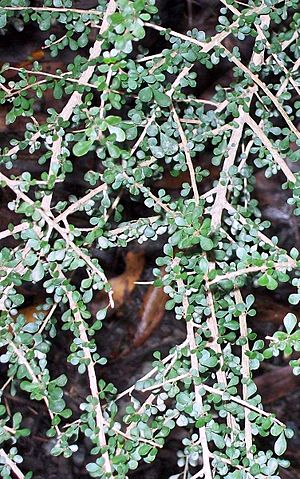Brush sauropus facts for kids
Phyllanthus microcladus is a special plant found in the warm, wet areas of eastern Australia. It's also known as the brush sauropus. This plant is very rare and is listed as endangered, which means it's in danger of disappearing forever.
Quick facts for kids Brush sauropus |
|
|---|---|
 |
|
| Brush sauropus | |
| Conservation status | |
| Scientific classification | |
| Genus: |
Phyllanthus
|
| Species: |
microcladus
|
| Synonyms | |
|
|
About the Brush Sauropus
The brush sauropus is a small, unique plant. It grows near streams in subtropical rainforests. You can find it from Grafton, New South Wales in the south up to the southeastern rainforests of Queensland. It's often seen in the valleys of the Brunswick, Richmond, and Tweed Rivers in northern New South Wales.
Why Is It Endangered?
Sadly, the brush sauropus is facing many threats. Its natural homes have been cleared away. This happened to make space for farms and houses.
The groups of plants that are left are small and spread out. They are also threatened by unwanted plants, called invasive weeds. These weeds can take over the space and resources the brush sauropus needs.
Another problem is that farm animals, like cattle, can accidentally step on and crush the plants. Also, rivers and streams can wear away the land where the plants grow. This is called stream erosion. All these things make it hard for the brush sauropus to survive.
What Does It Look Like?
The brush sauropus is a small plant that doesn't have any hairs. It can grow up to 35 centimeters (about 14 inches) tall. It has many tiny branches.
Its leaves are very small, usually 4 to 8 millimeters long and 2 to 5 millimeters wide. The stems that hold the leaves are only about 1 millimeter long. The leaves are mostly round but can be a bit wedge-shaped. The underside of the leaves looks a bit pale or bluish-green.
This plant flowers in the summer months. Its flowers grow on stems that are quite long. After flowering, it produces a small fruit. This fruit is a tiny capsule, only about 3 millimeters long. Interestingly, the male and female flowers grow on different plants.
See also
 In Spanish: Phyllanthus microcladus para niños
In Spanish: Phyllanthus microcladus para niños


